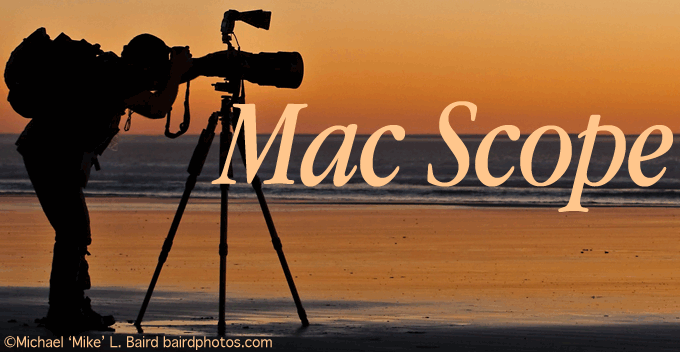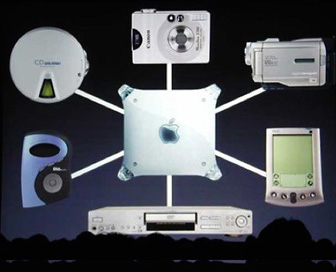2001: Enough hay has been made of the recent softening of the PC market to last us until next year. The PC is dead! The vultures fly around the PC market! Consumers abandon PCs in droves! Handhelds are where it’s at!
Unfortunately, while Steve Jobs may not always be right, he’s probably pretty close with his digital lifestyle prediction.

At first, I wasn’t so sure. All recent data points to a massive surge in handheld/wireless device use and a serious slowdown in the PC market. More people are buying handhelds and fewer are buying cumbersome PCs.
 I do believe, however, that a central hub to hold all of the information that these wireless devices will create is necessary. At the very least, one big backup machine for all your critical data will be necessary.
I do believe, however, that a central hub to hold all of the information that these wireless devices will create is necessary. At the very least, one big backup machine for all your critical data will be necessary.
The PC manufacturers are echoing Jobs’ mantra that the digital lifestyle is starting, and they are well equipped to handle it.
Unfortunately, I can’t see other PC makers (Dell, Compaq, Gateway etc.) handling this lifestyle as well as Apple. Fundamentally, they are simply companies that assemble computer boxes. Nothing is truly their own. Coupled with clunky Windows software, the digital lifestyle may not be one that you might enjoy.
It’s looking like two things will make the digital lifestyle enjoyable: the software you use to take full advantage of it and the peripherals you use to get involved in it. The stuff in between (hard drives, memory, processors) is looking less and less like a deal breaker for most consumers.
Part of the downturn in the PC market has been attributed to the fact that consumers are finally realizing that they don’t need the fastest machine in the world to check their email. Hardware released by Apple or Dell will be perfectly capable of handling whatever is thrown at it. The relevance of chip performance will, I think, become less important as time goes on. Of course, this won’t stop Jobs from running his Pentium-bashing demonstrations anytime soon.
Folks are just getting smarter, I guess. The question is no longer, “Is it the fastest?” Now it’s, “Can it get the job done?” This is the question that should have been asked all along.
If the hardware is less important, its ability to work seamlessly with external devices will become more important. Can I hook my digital camera to it? Can I get my video on the hard drive? Can I control my house lights from it? Can I sync my Palm with it? These questions and many others will become more important than clock speed.
Apple is in a unique position here. With the advent of USB and FireWire, finding a peripheral for your Mac is no longer a chore. Hook it up and go. The Mac can easily handle peripherals that people will be using in their digital lifestyle because they control both the hardware and the software.
Apple does, however, have some things to work out with companies like Palm or RIM. Devices from these companies do not always work well with the Mac. Because they will be playing a major role in the digital lifestyle, it’s Apple’s job to make sure that wireless devices work seamlessly with the Mac OS. If Jobs is truly a champion of this new lifestyle, this should happen.
So far the Mac is well positioned to take advantage of this new lifestyle (if it should come to pass). They are no better or worse off than their competitors, anyway.
Software makes up an important aspect of the new lifestyle envisioned by Jobs and Apple’s competitors. Apple, I feel, will have an edge here. With the release of Mac OS X, Apple will have a stable, usable, and friendly operating system. Applications like iMovie that enhance the digital lifestyle are bundled with the machine. Controlling the hardware and the software ensures a reasonably seamless integration between peripherals, hardware, and software.
Apple’s competitors are not so well positioned. They must suffer the vagaries of the Windows operating system. By all accounts, Windows has made vast strides instability but, unfortunately, has retained the Windows 95 look and feel. Bundled software like Windows Movie Maker is, by most accounts, a pale shadow of iMovie.
The point here, I think, is that the playing field has leveled out considerably over the last few years. Advantages to using Windows with all its problems were eliminated when Apple got in line with peripheral manufacturers and started developing its own, superior software to complement the Mac OS.
Invariably, there are fewer reasons not to choose a Mac than in the past. Conversely, there are also fewer reasons not to choose a Windows-based PC.
However, OS X has the beauty and brains that may entice more users to realize that using a Mac can only enhance the digital lifestyle. With its stability, speed, peripheral acceptance and rocking software, Apple is poised to take advantage of this new lifestyle.
If it materializes, that is.
keywords: #digitallifestyle #digitalhub

